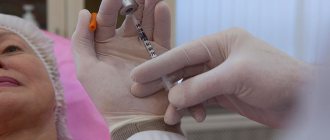A pregnant woman, like no one else, wants to look beautiful, young and fresh. However, when preparing for imminent motherhood, expectant mothers are primarily concerned not about their appearance, but about the proper development of the child, and therefore avoid the negative effects of nicotine, alcohol and all kinds of medications. It is for this reason that many women think about the safety of modern cosmetic procedures - in particular, Botox injections. So are these two concepts compatible: Botox and pregnancy?
How does the product work?
Unfortunately, over the years, the skin does not become younger, and even expensive creams or masks do not bring the desired effect. This pushes women to lean toward other methods of combating aging.
In this case, “BOTOX”, a botulinum toxin drug from Allergan, can come to the rescue. Today it is popular. But how does it work?
Botulinum toxin is a botulinum toxin. This is the most powerful poison that exists in the world, it is used in medicine, biological development, and even bioterrorism, but for the rejuvenation procedure a minimal dosage is used.
It is injected into the skin, after which the nerve endings are blocked, causing minor paralysis of the muscle into which the toxin was injected.
This leads to the fact that the muscle relaxes and no longer contracts, wrinkles begin to smooth out, and the skin tightens.
Often, the effect of such a procedure lasts at least 3-4 months.
Patients may even claim that the effect lasts up to 1-2 years. But this is not true, since the drug stops working after 4 months, and then muscle memory is observed, which in some people with a stable psyche and poor facial expressions can create a long-lasting effect. After some time, the memory will resume.
Many representatives of the fair sex have already appreciated the benefits of botulinum toxin and regularly undergo its administration.
But what if a woman is planning to conceive a child or is already pregnant? Is it possible to inject this drug? What consequences might occur?
The principle of action of the toxin
To correct wrinkles and other defects, a sterile form of neurotoxin type A, a toxic substance produced by a bacterium, is used. Numerous studies have confirmed its effectiveness in temporarily blocking muscles.
Poison in negligible doses, when injected, paralyzes the nerve endings of the muscles in the affected area. There is a disruption in communication with the brain. Previously overactive muscles relax. Muscle immobility occurs at the injection site.
The static position of the muscles does not allow the use of facial expressions in the usual way. There is a change in the motor activity of the skin. Previously moving, folded integuments remain smoothed. Muscle memory is formed, reducing the activity of facial expressions.
The effect of the toxin is limited in time. The maximum strength of the drug is visible 14–30 days after the injection. Gradually, normal muscle function is restored. This is due to the growth of new nerve endings. The process takes 3–9 months. The rate of regression is related to the individual characteristics of the body, the drug used, and the number of units administered.
Returning to the original state does not mean complete removal of the toxin from the body. A small amount of the substance remains in the tissues. Toxin tends to accumulate. Even if the concentration is negligible, the poison is present in the body. It is difficult to say how long the remaining toxin will remain in the body. It all depends on the individual metabolism.
How does the drug affect the health of a pregnant woman?
There is no exact data on how the expectant mother’s body will react to botulinum toxin. But doctors studied this drug by conducting experiments on animals.
It was found that botulinum toxin during pregnancy can provoke the following consequences:
- You may begin to feel dizzy and weak.
- If the body does not tolerate this remedy, then the woman may experience an allergic reaction. Allergies manifest themselves in the form of swelling, itching, and cough. As a result, the expectant mother's immunity will deteriorate.
- During pregnancy, special hormones are produced. Therefore, a woman is more vulnerable to various consequences that may appear after the injection. As a result, the drug may act unpredictably.
- After the injection, digestion may worsen.
Before such a procedure, many patients are very worried that it will negatively affect the health of the unborn baby. The pain that occurs during the injection will also not be beneficial.
Botox injections are not losing their popularity. In 2021 alone, almost 7.5 million procedures involving the administration of this drug were recorded. But during pregnancy it would be worth refraining from this manipulation.
Plastic surgeon Carlo Honrado
Strabismus
Deviation of the visual axes from the direction towards the object in question, in which the coordinated work of the eyes is disrupted and it becomes difficult for both eyes to fixate on the object of vision. BTA is considered an alternative to surgery.
Table 2.
| Study | Number of BTA injections | Dosage/Duration of treatment | Result |
| Morgan, 20048 | Two patients with strabismus received BTA during pregnancy | 1.25 to 300 IU | The therapeutic effect did not cause complications or fetal abnormalities |
| Lee Yim12 | 17 year old woman. The drug was administered before the patient knew she was pregnant | 2.5 IU | A healthy baby was born |
How does the drug affect the fetus?
As mentioned above, the fact that botulinum toxin harms the unborn baby has not been proven. Conducting studies on animals, scientists noticed that when using the drug, the risk of miscarriage or the birth of a child with various abnormalities increases.
Many experts advise women who are preparing to become mothers to refuse such rejuvenation, as the drug can cause unpleasant consequences for the child.
Experts have not conducted studies that would reveal how Botox affects pregnancy. This also applies to alcohol. Therefore, it is better not to take risks.
Plastic surgeon Carlo Honrado
Fertilization with adenomyosis
With adenomyosis, most women experience a disorder such as menstrual irregularities. This, in turn, causes difficulty in determining the day of ovulation. To calculate the favorable period for conception, a woman has to use a test or regularly measure her basal temperature.
Another problem that can become an obstacle to conception is the formation of adhesions, which sometimes become an insurmountable barrier for sperm on the long journey to the egg. The progression of adenomyosis is often accompanied by associated complications that can negatively affect a woman’s ability to conceive. Infertility can be caused by:
- inflammatory complications developing against the background of adenomyosis;
- decreased patency of the fallopian tubes;
- disruption of the maturation process of female germ cells;
- a change in the properties of the endometrium, as a result of which a fertilized egg cannot implant in the uterus.
The effect of botulinum toxin during different periods of pregnancy
So is it possible to use botulinum toxin during pregnancy? This is influenced by the period of pregnancy.
| Period | Is it possible to inject botulinum toxin? | Arguments |
| Before pregnancy | Yes | Before pregnancy, the use of botulinum toxin is permitted. The fact is that it does not accumulate in tissues. It follows from this that this poison will not harm the child if the woman is still planning a pregnancy. Therefore, you can safely go to a cosmetologist. |
| Before conception | A month before the planned conception, a woman should refrain from the procedure | In order not to encounter negative consequences, experts advise going for the procedure a month before the planned conception in order to protect the female body from stress. In addition, the injection can provoke a weakening of the immune system. Before conceiving, you need to try not to be nervous, give up alcohol, cigarettes and botolutoxin. |
| In the early stages | No | If a woman is going through the first trimester of pregnancy, then botolutoxin is strictly contraindicated. The fact is that during this period the baby’s nervous system is formed. The expectant mother must protect herself from negative influences, as otherwise it will have a bad effect on the baby’s health. In addition, in the early stages there is a high risk of miscarriage. |
| In the second trimester | No | Often the second trimester is characterized by stability and rapid development of the baby. The fruit begins to increase in size. At this stage, experts advise abandoning botolutoxin. At 4-7 months of gestation, the release of special hormones is observed. If the drug is administered, the body may provoke an unexpected reaction. It can manifest itself in the form of an allergic reaction or shock. Therefore, doctors advise not to take risks. |
| Before birth | Undesirable | It is not prohibited to administer botolutoxin before childbirth, but doctors believe that this is an unwise decision. Such an injection can easily provoke premature birth. In addition, the administration of the drug carries with it the risk of unpleasant consequences, which are undesirable to encounter before the birth of the baby. The woman is advised to postpone this procedure, try to protect herself from stressful situations and gain the strength that she will still need. |
| While breastfeeding | Undesirable | Doctors do not advise representatives of the fair sex who are breastfeeding their children to undergo the procedure of administering botolutoxin. In addition, there is a ban on the consumption of alcohol and various medications during lactation. |
Symptoms of adenomyosis
At the very beginning of the development of pathological processes in the myometrium, any pathological symptoms that force a woman to be wary and consult a doctor are completely absent. But as it progresses, the condition noticeably worsens.
The main complaint when the walls of the uterus are damaged by the endometrium is pain of varying intensity, localized mainly in the lower abdomen, perineum, and sometimes in the lumbar region. A woman may also experience severe discomfort during intimacy.
The pain syndrome becomes more intense before menstrual bleeding, because the endometrium contains hormonal receptors that respond to hormonal fluctuations. In addition to pain and discomfort before and after menstruation, a woman may be bothered by brown or bloody discharge. The menstrual cycle is often disrupted - the intervals between periods become shorter, and the periods themselves are more protracted, accompanied by heavy bleeding.
If there is no treatment for adenomyosis, against the background of heavy blood loss, an anemic iron deficiency syndrome develops, characterized by the following symptoms:
- dizziness;
- weakness, lethargy, drowsiness;
- decreased performance;
- blanching of the skin and mucous membranes;
- arrhythmia;
- increase in viral infectious diseases.
When can botulinum toxin injections be done after childbirth?
Experts advise going to a cosmetologist for a botulinum toxin injection procedure no earlier than 7-8 months after the baby is born, if the lactation period has already ended.
If a woman breastfeeds her child for a long time, then this method of rejuvenation should be used 2 years after childbirth.
During this period of time, the female body will fully recover and will be able to endure the procedure. Only in this way can you protect yourself from troubles and protect the health of your baby.
Lactation is a process that is the result of a specific hormonal background in a woman during the postpartum period. An unforeseen circumstance may be a reduction in the duration of the drug, even up to 1 month.
This must be taken into account, since the cost of the drug is considerable. Also, do not forget about getting used to the drug and losing sensitivity to the toxin if used too often (for example, every month or two).
After Botox, some patients complain of headaches and weakness. And it is more difficult for a pregnant woman to endure these consequences.
Dermatologist Jessica Krant
Esophageal achalasia
Functional obstruction of the esophagus. Characterized by loss of lower esophageal sphincter (LES) activity and esophageal motility; the main symptoms are dysphagia, chest pain and reflux.
Treatment options include diet, calcium channel blockers, and Heller myotomy. BTA can be injected locally into the stomach area. The procedure does not require deep anesthesia, and can relax the LES and relieve esophageal obstruction.
Table 3.
| Study | Number of BTA injections | Dosage/Duration of treatment | Result |
| Wataganara et al., 200913 | From 18th week | 80 U BTA | A healthy infant was born at 36 weeks' gestation and no swallowing problems were noted until 6 weeks postpartum. |
| Hooft 201514. | BTA at 14 weeks of pregnancy | 100U | Healthy baby |
| Holliday 201615 | BTA at 31 + 3 weeks of pregnancy | – | Eclampsia and childbirth at 37 + 4 weeks of pregnancy |
Question answer
Your doctor may be right in this situation.
Remember that Botox does NOT smooth out wrinkles. It only weakens the core muscles. This can cause wrinkles to smooth out or weaken the muscles that are important for blinking and closing your eyes safely. Additionally, too much Botox in an area can actually cause sagging and bagging. There are frequent discussions regarding this issue. Some experts believe that lying down can cause gravity to shift Botox to other areas that we don't want to hit. But this has not been proven or studied. But most doctors tell their patients this recommendation. After 4 hours there is no problem and you can lie on your back if you want.
Botox results typically last three to four months, but can last up to six months. Regular injections lead to a cumulative effect, which means that in the future you will need to visit the cosmetologist less often.
Migraine
Some migraine medications are considered unsafe for pregnant women18.
In 2000, Binder et al were the first to report that BTA was successfully used in patients with headache19. In a meta-analysis of 17 studies involving 3646 patients with chronic migraine, Brula et al found that BTA significantly reduced chronic migraine symptoms after 3 months of treatment compared with placebo; therefore, BTA was considered safe and well tolerated20.
New research 2021
Revance has developed a new drug that is likely to be approved by the FDA soon. The effect after it lasts longer than after Botox, Dysport and other conventional drugs.
In this regard, experts wondered whether it was possible to somehow increase the duration of Botox. To achieve this, we decided to increase the dosage.
It was necessary to study the safety of such an experiment. 401 participants voluntarily agreed to participate in the study. 75% of people had their dose increased.
The volunteers were under the supervision of specialists for 9 months. It has been proven that administration of the drug at higher dosages is safe. But the effect lasted longer - up to 9 months.
But you need to understand that increasing the dosage will make the procedure more expensive.
Some additional information
Alarming are the descriptions of, although isolated, side effects of botulinum toxin, which for medical and cosmetic purposes is produced under such trade names as “Botox”, “Relatox”, “Lantox”, etc. and is a complex protein complex, connecting to the neuromuscular synaptic structure and interrupting the conduction of impulses.
Rare side effects are associated with the spread of the active substance to a distance distant from the injection site. For example, even when used in recommended therapeutic dosages, severe muscle weakness, difficulty swallowing, and constipation are possible. Isolated cases of cardiac arrhythmia, myocardial infarction, aspiration, and epileptic seizures have also been described. In some of these cases, it was established that patients had a predisposition to certain diseases that had not been identified before the administration of Botox, were taking medications from a certain group of antibiotics and other medications, as well as chronic somatic, especially neurological, pathology that had not been taken into account by the cosmetologist.
Despite different production methods, botulinum toxin preparations remain a biological protein substance, which, with repeated administration, can cause a reaction of the immune system with the formation of immune antibodies. This explains the description of the development of individual cases of hypersensitivity in the form of local swelling of soft tissues, urticaria, serum sickness, respiratory distress and even anaphylactic shock.
After the period of market promotion of these products in the literature and individual reports, descriptions (without taking into account indications) of complications in the form of general weakness and malaise, muscle atrophy, respiratory depression with the development of respiratory failure, sound pronunciation disorders, strabismus, peripheral neuropathy, dryness in the oral cavity, abdominal pain, nausea, vomiting and diarrhea, significant loss of appetite, erythema multiforme, skin itching, psoriasis-type dermatosis, pathological hair and eyelash loss, etc. Despite the sporadic nature of these cases, they indicate the possibility of negative resorptive the effects of even therapeutic doses of botulinum toxin preparations.
If all the brief information given in the article is not convincing enough for many women who are pregnant or planning pregnancy, they should at least think about the following questions. Why do we, when purchasing any medicine (even for a runny nose), pay attention to the instructions describing contraindications for its use? Why do doctors of medical institutions bear administrative or criminal liability if a sick person develops complications associated with the prescription of medications without taking into account the instructions regarding contraindications?
In the instructions for Botox, in the “Contraindications” section, one of the points clearly states “pregnancy”, “lactation (breastfeeding)”. Why does a cosmetologist, who recommends the procedure and convinces of the safety of Botox and its analogues, violate the recommendations specified in the instructions, and does not even inform his patients about them?
What side effects may occur?
Many people are scared by the fact that the product contains poison. But it is contained in minimal dosages, so it does not harm human health.
It is worth remembering that each person is individual, and it is impossible to predict the body’s exact reaction to the drug. In medical practice, many cases of side effects have been recorded.
They do not benefit human health, and pregnant women should not encounter them at all.
After the administration of botulinum toxin, the following consequences may appear:
- The skin in the place where the needle is immersed receives microtrauma. They can provoke an inflammatory process, pain, swelling, and bruising. These are temporary side effects that disappear after a couple of days.
- Facial asymmetry may appear and the eyelid may droop. This often happens due to doctor errors, as confirmed by reviews and forums where women share their experiences with botulinum toxin. Therefore, cosmetologists strongly recommend choosing a clinic or salon responsibly.
- It is worth understanding that each human body is unique; it can react in its own way to the drug that is administered. It is impossible to predict the reaction. This could be redness or an allergic reaction. But there were cases when patients felt sick, vomited, got sick and felt dizzy. Such unpleasant consequences are especially harmful for pregnant women.
During pregnancy, immunity decreases. This is why the risk of infection entering the places where the needle was inserted and the appearance of inflammation increases.
Plastic surgeon Naveen Somiya
Most gynecologists and cosmetologists do not advise pregnant women to undergo the botulinum toxin injection procedure, because it is impossible to know for sure that the drug will not cause side effects. To protect yourself and your unborn baby, you should postpone the injection.
To finally decide whether botulinum toxin is needed during early and late pregnancy, it is recommended to read the reviews of gynecologists and cosmetologists, which are presented below.
Botox in the 2nd and 3rd trimester of pregnancy
As a rule, by the 2nd trimester there is already a kind of barrier between the fetus and the mother’s body - the placenta. It is she who is called upon to protect and protect the baby’s body from any negative influence from the outside. If the pregnancy proceeds without complications and there are no violations of the placental barrier, then most likely the botulinum toxin injection will not have a significant effect on the fetus.
But we must not forget about common placentopathy, especially in late pregnancy. After all, if the place of attachment is changed, there are breakdowns in the structure of this temporary organ, then its protective function may be impaired. As a result, botulinum toxin can enter the fetus’s body through the maternal bloodstream, causing mutations, various pathologies and other problems. In the 3rd trimester, most mothers experience aging of the placenta to a greater or lesser extent; a feature of this period can be considered the greatest vulnerability of the child. That is why pregnant women should definitely not even think about Botox injections in the later stages.
Expert opinion
- Cosmetologist
- Surgeon
- Dermatologist
Irina Dorofeeva
practicing cosmetologist
There have been cases when pregnant women came to undergo the botulinum toxin injection procedure. But I always correctly refuse such patients. During pregnancy, a woman is responsible not only for herself, but also for the health of her unborn baby. The safety of injections during this wonderful period has not been confirmed, since scientists have not fully studied this issue. I recommend that patients who are carrying a fetus lean towards cosmetic products of natural origin. With their help you can achieve good results. If a woman had an injection, but did not yet know about her pregnancy, then she needs to tell the gynecologist about this procedure.
Michelle Place
plastic surgeon
I do not consider botulinum toxin harmful to human health. Otherwise it would have been banned. But, nevertheless, I believe that during planning for conception, pregnancy and lactation, injections should be abandoned. Women need to be especially careful in the early stages; this is repeatedly stated in reviews of other doctors. You should not risk your health and the health of your baby. It is better to wait a while, and after lactation, calmly go to a cosmetologist.
Christina Steil
dermatologist
To date, doctors are still arguing about the safety of botulinum toxin during pregnancy, which is confirmed by reviews. Some experts believe that these injections do not harm the expectant mother and baby, since the concentration of the substance in the drug is minimal. As a result, the drug can only provoke local side effects, but there is no need to be afraid of serious consequences. Other doctors are categorically against the use of botulinum toxin for pregnant women. However, we can say for sure that no studies have been conducted on the effects of the drug during pregnancy on humans. Therefore, it is impossible to accurately know the future reaction of the body. Is it worth risking the health of your baby for the sake of beauty, if the procedure for injecting botulinum toxin can be carried out after the birth of the baby? I believe that it is worth worrying about your child and postponing such rejuvenation.
What the instructions say
At first glance, the answer to the question “is it possible to inject Botox during pregnancy?” is quite simple and obvious, of course not. Indeed, the instructions of the manufacturer of this drug, the US pharmaceutical concern Allergan, clearly indicate that expectant mothers should refrain from injections of the drug Botox. The same recommendation is given by very well-known companies that produce its analogues - Dysport, Xeomin, Relatox, Lantox.
But knowledgeable people - both cosmetologists themselves and their regular clients - often argue that this restriction is arbitrary, because there are no real facts about the harmful effects of the drug on both the body of the mother and the fetus.
The reason for this lack of coverage of this medical issue lies in the lack of experiments and research on the topic: “Botox and pregnancy” among the human population. This is due to the fear of responsibility. After all, even the largest and most famous pharmaceutical companies do not want to risk the health of their potential clients and their children in order to obtain a firm answer to this question.











